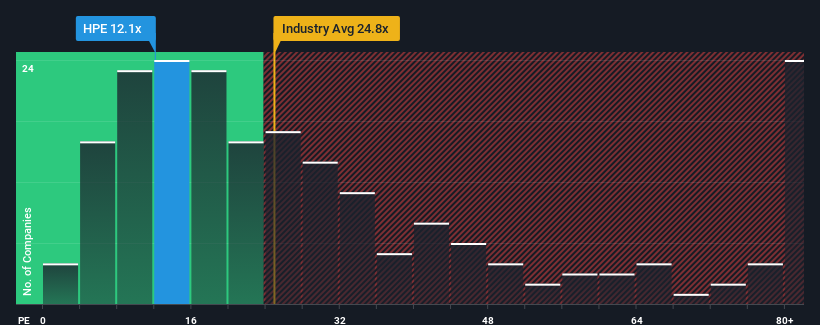- United States
- /
- Tech Hardware
- /
- NYSE:HPE
Market Cool On Hewlett Packard Enterprise Company's (NYSE:HPE) Earnings

Hewlett Packard Enterprise Company's (NYSE:HPE) price-to-earnings (or "P/E") ratio of 12.1x might make it look like a buy right now compared to the market in the United States, where around half of the companies have P/E ratios above 18x and even P/E's above 33x are quite common. Nonetheless, we'd need to dig a little deeper to determine if there is a rational basis for the reduced P/E.
Recent times have been pleasing for Hewlett Packard Enterprise as its earnings have risen in spite of the market's earnings going into reverse. It might be that many expect the strong earnings performance to degrade substantially, possibly more than the market, which has repressed the P/E. If not, then existing shareholders have reason to be quite optimistic about the future direction of the share price.
Check out our latest analysis for Hewlett Packard Enterprise

Is There Any Growth For Hewlett Packard Enterprise?
In order to justify its P/E ratio, Hewlett Packard Enterprise would need to produce sluggish growth that's trailing the market.
If we review the last year of earnings growth, the company posted a terrific increase of 124%. Although, its longer-term performance hasn't been as strong with three-year EPS growth being relatively non-existent overall. Accordingly, shareholders probably wouldn't have been overly satisfied with the unstable medium-term growth rates.
Shifting to the future, estimates from the analysts covering the company suggest earnings should grow by 9.8% each year over the next three years. Meanwhile, the rest of the market is forecast to expand by 10% each year, which is not materially different.
In light of this, it's peculiar that Hewlett Packard Enterprise's P/E sits below the majority of other companies. It may be that most investors are not convinced the company can achieve future growth expectations.
The Key Takeaway
It's argued the price-to-earnings ratio is an inferior measure of value within certain industries, but it can be a powerful business sentiment indicator.
Our examination of Hewlett Packard Enterprise's analyst forecasts revealed that its market-matching earnings outlook isn't contributing to its P/E as much as we would have predicted. There could be some unobserved threats to earnings preventing the P/E ratio from matching the outlook. At least the risk of a price drop looks to be subdued, but investors seem to think future earnings could see some volatility.
It's always necessary to consider the ever-present spectre of investment risk. We've identified 3 warning signs with Hewlett Packard Enterprise, and understanding them should be part of your investment process.
If P/E ratios interest you, you may wish to see this free collection of other companies with strong earnings growth and low P/E ratios.
Valuation is complex, but we're here to simplify it.
Discover if Hewlett Packard Enterprise might be undervalued or overvalued with our detailed analysis, featuring fair value estimates, potential risks, dividends, insider trades, and its financial condition.
Access Free AnalysisHave feedback on this article? Concerned about the content? Get in touch with us directly. Alternatively, email editorial-team (at) simplywallst.com.
This article by Simply Wall St is general in nature. We provide commentary based on historical data and analyst forecasts only using an unbiased methodology and our articles are not intended to be financial advice. It does not constitute a recommendation to buy or sell any stock, and does not take account of your objectives, or your financial situation. We aim to bring you long-term focused analysis driven by fundamental data. Note that our analysis may not factor in the latest price-sensitive company announcements or qualitative material. Simply Wall St has no position in any stocks mentioned.
About NYSE:HPE
Hewlett Packard Enterprise
Provides solutions that allow customers to capture, analyze, and act upon data seamlessly in the Americas, Europe, the Middle East, Africa, the Asia Pacific, and Japan.
Flawless balance sheet and undervalued.
Similar Companies
Market Insights
Community Narratives




